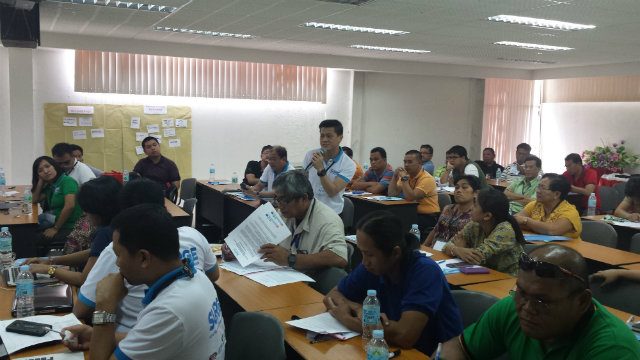SUMMARY
This is AI generated summarization, which may have errors. For context, always refer to the full article.

MANILA, Philippines – Local government units (LGUs) and civil society organizations (CSOs) representatives unite for an improved Disaster Risk Reduction Management (DRRM).
Both sectors agreed that the country still has a lot of specific needs and gaps that need to be addressed, in spite of Republic Act 10121 or the Philippine DRRM Act of 2010.
Cooperation
A series of roundtable discussions (RTD) were organized across different regions, with the aim to increase resilience of high-risk communities.
In Western Visayas, representatives from the Provinces of Antique and Iloilo, alongside representatives from the Philippines Visayas Foundation, Inc. (UPVFI), Christian Aid and the Iloilo Code of NGOs (I-CODE) came together to discuss effective was to prepare and respond to disasters.
This RTD is one of the component activities of the Scaling-up Resilience in Governance (SURGE) project. It is the fourth in a series of roundtable discussions with two already held in the CARAGA region and one in the Davao region.
It extends inclusive community-based disaster risk reduction (ICBDRR) to more communities and advocates improvements in disaster risk management policies and practices.
A regional launch for Western Visayas and press conference preceded the RTD where Ma. Aletha Nogra of the Office of Civil Defense (OCD) Region VI, Prof. Jorge Ebay of UPVFI and Alvic Padilla of Christian Aid fielded questions from the media.
“In our experience in typhoon Yolanda, we really need more partners to advance DRRM in saving lives and minimizing damage to properties,” said Nogra.
“SURGE doesn’t have a component on post-disaster but it hopes to make communities better prepared to respond to that,” added Padilla.
Policy
The first resource speaker was Malu Felizar Cagay, Vice Chairperson of the Asian Disaster Reduction and Response Network (ADDN) who discussed an overview of RA 10121 since its implementation in 2010.
RA 10121, which was signed and approved by former President and now Pampanga Representative Gloria Macapagal–Arroyo on May 27, 2010, was put into effect on June 24, 2010 after 14 years in the making.
Ven Paolo Valenzuela of the Center for Disaster Preparedness (CDP) presented the session From Sunset Review to Sendai focusing on the overview of the regional and international policy processes on DRR.
He also focused on the 3rd World Conference on DRR (WCDRR) held on March 14 – 18, 2015 in Sendai, Japan. The WCDRR was an opportunity to review the Hyogo Framework for Action (HFA) 2005 – 2015 and inform a post-2015 framework with lessons from local lived experiences especially those from the Philippines and a more coherent link to the post-2015 climate deal to be negotiated this December in Paris and post-2015 Millenium Development Goals (MDGs) to be ratified come September this year. In addition, the second phase of HFA ratified in Sendai two weeks ago aimed to have signatory countries commit to more inclusive DRR practices.
HFA was formulated after world leaders committed to pay attention and take action in reducing disaster risk, and adopted guidelines to reduce vulnerabilities to natural hazards. It assists the efforts of nations and communities to become more resilient to, and cope better with, the hazards that threaten their development gains.
Learning from the lessons of the Bandah Aceh tsunami which devastated Indonesia in 2004, HFA is a global blueprint for disaster risk reduction efforts with a 10-year plan, adopted in January 2005 in Hyogo, Japan by 168 governments at the World Conference on Disaster Reduction.
Ebay also presented UPVFI’s Rehabilitation for Island Sustainability and Empowerment (RISE) project in the island communities of Carles. He focused on the peculiar vulnerabilities and hazards by geographically isolated and depressed areas (GIDA) and how CBDRR contributes to building resilience in the case of the Gigantes islands.
Preparation for Sendai
Areno thanked the LGU partners “who are providing good policy support to communities most especially those who are here from Antique and Iloilo both covered by Christian Aid and other non-Christian Aid areas.”
“We hope that the inputs that were derived in this two-day workshop will be able to put forward to elevate these concerns and bring forth to the attention of our PRMCs who are also present here so that we can be able to come up with good policy agenda and communication messages that will be used in the future,” he said.
“Thank you also for the opportunity for us to prepare for the coming Sendai pre-meetings and probably we can participate in that event so that our voices will be heard also in the global level,” he added. – Rappler.com
Add a comment
How does this make you feel?
There are no comments yet. Add your comment to start the conversation.